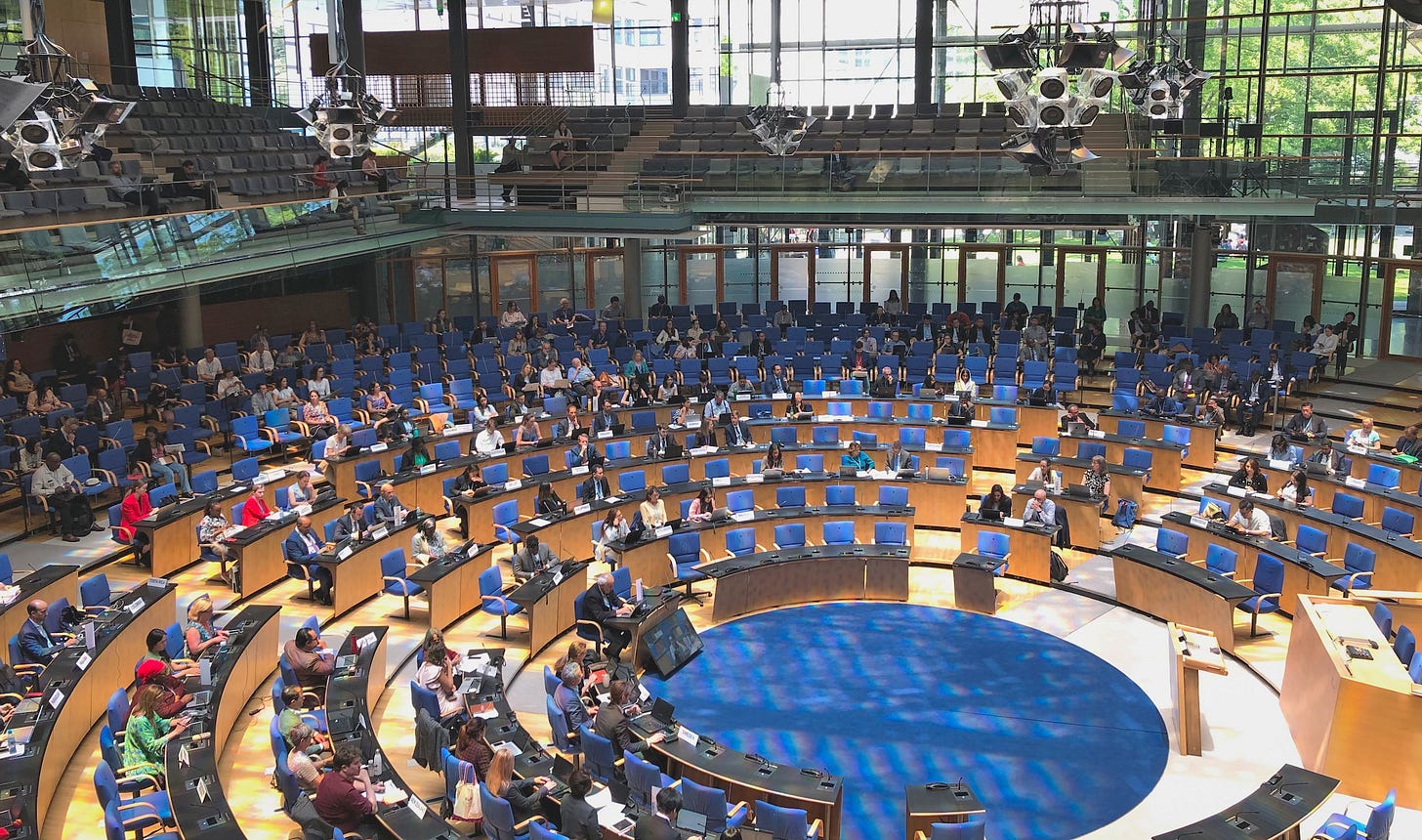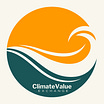Good governance is mission critical
From the report 'Beyond the Horizon: Priorities for a Livable Future', this chapter focuses on solidarity as a liberating force, making responsible innovation and human rights into living reality.
The urgent pressures tied to climate-related politics and geopolitics are partly rooted in the problem of still expanding emissions and steadily worsening and compounding climate disruption. Climate urgency is also driven by the need to reduce the very real, personal physical danger already affecting hundreds of millions of people around the world and putting government budgets and fiscal sustainability at risk.
Food systems are facing increasing risks of short-term shocks and long-term collapse; the drivers of conflict are becoming harder to control, as global heating makes more regions hard to live in.

But there is another kind of urgency linked to climate geopolitics, and that is the need of everyone who depends on responsible governance (i.e. everyone) to know that institutions can be trusted to:
Serve the public interest honestly and in good faith;
Identify real-world problems and set clear, practical, and ambitious goals to solve them;
Honor transcendent human rights of both today's constituents—to whom they owe the benefits of their time in office—and of future generations, who cannot speak for themselves;
Follow through on commitments—especially those that carry existential meaning for the rest of humankind.
Governments often cite this need for trustworthiness in other governments who would be their partners. In the waning years of the Cold War, the Russian proverbial adage "Trust, but verify" was adopted by the leadership of the United States, as a reminder that trust-building needs to be cooperative, and verifiable. Not enough governments have held themselves to this same standard, however, when it comes to fulfilling promises to their own people or to each other to avert climate breakdown and build a resilient future.
Solidarity is a liberating force. It allows larger numbers of people to work together in good faith, while organizing around a common purpose. Solidarity also brings with it a powerful reminder to pay attention to the plight of the vulnerable, to take an interest in those who might need support, to see injustice against others as a wrong to be righted by whatever talent we can bring to the challenge. Governments that set aside solidarity and decline to act on their commitments—or leave known needed work undone, letting grave problems get worse—lose the faith of their people and of partners abroad, and that trust deficit can eventually become a leading barrier to well-reasoned timely problem-solving.
If we are to build a world that is livable—affordable, just, full of opportunity and reliably safe, for all people—then good governance is mission critical. In its absence, we risk a future shaped by corrupt and unaccountable networks that do not act in the public interest or toward the basic needs of most of humanity.
Governments at all levels benefit greatly from their constituents being engaged, trusted, uplifted, and rewarded by the processes they manage. People around the world are calling on governments to be led by servant leaders and to represent the most transcendent and humanizing responses possible to the many crises unfolding on their watch. Good governance—earning the trust and faith of those who must live with your decisions—is a necessary investment in future success.
Access to information cannot be optional.
A key priority for enabling high-impact, far-reaching, inclusive processes that reflect the liberating force of solidarity is that access to information cannot be optional. All people have a right to access evidence that supports smarter decision-making. All people have a right to expect that institutions will not ignore reality and instead focus on the narrow interests of a few.
Those institutions that are most consistent and effective at accessing the latest, highest quality information relevant to their decisions can establish a more comprehensive and capable understanding of risk and opportunity, and make better judgments about how to proceed. Access to information requires interest, consistent action and capability, and availability, which is often beyond the control of the individual or institution.
An open and unpersecuted press makes it far easier and more cost effective for a society, and its governing institutions, to have access to the most up to date and actionable information. Communities that have more robust independent press outlets operating locally tend to be more informed, better equipped to make proactive decisions that prevent future problems, and to adjust to adversity when needed.
Scientists and science institutions also need independence from industry interests or authoritarian political elites. Only when they are free to ask the right questions, seek all available knowledge, and publish without fear of persecution, can scientists and science institutions ensure the best available information is available to all. Stakeholders consistently express a belief that public authorities and private enterprises should welcome mainstream science and not repress or seek to distort evidence that will help humankind prepare for, mitigate, and build resilience against climate shocks.
Open debate—as free as possible from political distortion or any form of coercion—is another sign of good governance that influences whether societies are prepared to 1) see adversity coming, 2) make adjustments in a timely fashion, 3) welcome and support the most inclusive and sustainable forms of future prosperity, and 4) engineer systems that are designed to work in sustainable, efficient, and just ways.
Access to information, a free press, unbiased science, and debate free of coercion or intimidation, are all signs that a society is prepared to grapple with and overcome crisis. Investors in the public and private sectors should welcome freer access to information, including open and participatory processes, so that high-level decision-making is more transparent, accountable, and informed.
Beyond this, the question of whether people have just and open access to the best available information points to a need for robust stakeholder participation in decision-making processes. The UN Climate Change Convention (Article 6) and the Paris Agreement (Article 12) both recognize this, and we have seen increasing progress toward awareness of the fact that non-governmental voices help to raise ambition, shape more effective and efficient policies and incentives, and make solutions more actionable in everyday experience.
Achieving the best future for humankind requires we do more of that, at local, national, and international levels.
It's time to get to work.
It is vital that governments act on existing legal obligations, honor human rights, and follow through on climate action commitments. The opportunities inherent in doing so far outweigh those available in a future of deep climate disruption. As the world gathers in New York, for the United Nations General Assembly and the Summit of the Future, we wish to highlight the many opportunities for multidimensional multilateral climate cooperation arrangements to build sustainable futures for societies large and small, at all levels of income.
An emerging theme, as we hear from more and more stakeholders, is that institutions that fail to act when risk is visibly getting worse lose trust. That loss of trust is also a loss of the freedom to act, and it slows down the overall societal response, whether crises are clearly forecast or take hold suddenly.
Intergenerational solidarity is an implicit responsibility of all public institutions. It is clear that the gravity of the Triple Planetary Crisis, and ongoing threats to human health, wellbeing, and security, from still worsening global heating and related climate change, directly implicates the rights and wellbeing of future generations in decisions we are making now.
Noting the General Assembly may adopt, as part of the Summit of the Future, a Declaration on Future Generations, CCI and the Climate Value Exchange—on behalf of our network of climate stakeholders and volunteer policy advocates around the world—call for a Declaration that acknowledges nations should act in an integrated and holistic way, across their many overlapping formal commitments, to create outcomes that meet the standard of sustainability not only for our own lifetimes, but for the future of humankind on our home planet. This should include catalytic co-investments that allow nations to act without delay toward that better future for all, by supporting sustainable practices that are safe for people and nature.
By acting in solidarity with those who will live generations from now, we give ourselves the opportunity to consistently act in line with higher standards of performance, innovation, competition, and good governance. This frees human potential from the pressure to support less ethical, less inclusive, less sustainable practices, so whole societies can be organized to put the wellbeing of all people, and of nature, at the core of their strategic initiatives and industrial pursuits.
We wish to acknowledge that draft work toward this Declaration on Future Generations recognizes:
the need to advance peace and security,
lawful and just societies,
the full legal personhood and economic empowerment of women and girls, and
the elimination of violence against women, vulnerable and Indigenous communities, and other marginalized groups.
All of these will be instrumental to achieving a livable future for people and nature, and all are linked to the overriding question of whether nature breakdown, biodiversity loss, and climate disruption, will lead to dangerous and unlivable conditions.
Not only have governments made big commitments to transform industries, economies, financial priorities, and the everyday risk and resilience calculus; they have already agreed to ways of working that can make all of this work in the best interests of everyone. The Paris Agreement calls for limiting global heating to 1.5ºC, preventing undue danger to people and nature, aligning financial flows with the overall agreement, and proactive international cooperation to set all of us up for success.
This last part can feel elusive, but our consultation has found that stakeholders see very clearly the opportunities inherent in key Paris Agreement provisions. Article 6.8 invites national governments to accelerate local, national, and global progress by combining "mitigation, adaptation, finance, technology transfer and capacity-building" to reduce climate risk, drive sustainable development, eradicate poverty, and foster robust climate-smart private sector economies. Not taking this opportunity raises serious questions; people are calling for better, faster action to weave the best possible future into their everyday experience.
Priorities for a Livable Future
FURTHER READING













